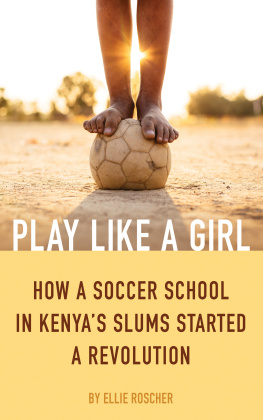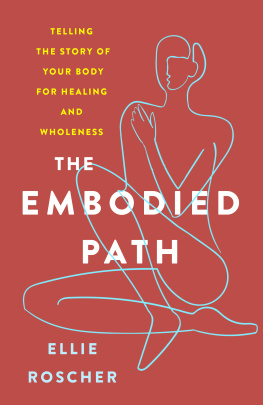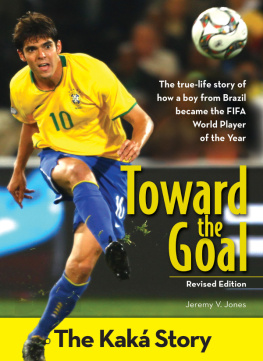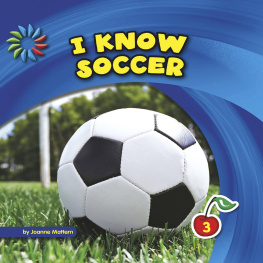Ellie Roscher - Play Like a Girl: How a Soccer School in Kenyas Slums Started a Revolution
Here you can read online Ellie Roscher - Play Like a Girl: How a Soccer School in Kenyas Slums Started a Revolution full text of the book (entire story) in english for free. Download pdf and epub, get meaning, cover and reviews about this ebook. year: 2017, publisher: Viva Editions, genre: Detective and thriller. Description of the work, (preface) as well as reviews are available. Best literature library LitArk.com created for fans of good reading and offers a wide selection of genres:
Romance novel
Science fiction
Adventure
Detective
Science
History
Home and family
Prose
Art
Politics
Computer
Non-fiction
Religion
Business
Children
Humor
Choose a favorite category and find really read worthwhile books. Enjoy immersion in the world of imagination, feel the emotions of the characters or learn something new for yourself, make an fascinating discovery.
- Book:Play Like a Girl: How a Soccer School in Kenyas Slums Started a Revolution
- Author:
- Publisher:Viva Editions
- Genre:
- Year:2017
- Rating:3 / 5
- Favourites:Add to favourites
- Your mark:
- 60
- 1
- 2
- 3
- 4
- 5
Play Like a Girl: How a Soccer School in Kenyas Slums Started a Revolution: summary, description and annotation
We offer to read an annotation, description, summary or preface (depends on what the author of the book "Play Like a Girl: How a Soccer School in Kenyas Slums Started a Revolution" wrote himself). If you haven't found the necessary information about the book — write in the comments, we will try to find it.
Ellie Roscher: author's other books
Who wrote Play Like a Girl: How a Soccer School in Kenyas Slums Started a Revolution? Find out the surname, the name of the author of the book and a list of all author's works by series.
Play Like a Girl: How a Soccer School in Kenyas Slums Started a Revolution — read online for free the complete book (whole text) full work
Below is the text of the book, divided by pages. System saving the place of the last page read, allows you to conveniently read the book "Play Like a Girl: How a Soccer School in Kenyas Slums Started a Revolution" online for free, without having to search again every time where you left off. Put a bookmark, and you can go to the page where you finished reading at any time.
Font size:
Interval:
Bookmark:
PLAY LIKE A GIRL

Copyright 2017 by Ellie Roscher.
All rights reserved. Except for brief passages quoted in newspaper, magazine, radio, television, or online reviews, no part of this book may be reproduced in any form or by any means, electronic or mechanical, including photocopying or recording, or by information storage or retrieval system, without permission in writing from the publisher.
Published in the United States by Cleis Press, an imprint of Start Midnight, LLC, 101 Hudson Street, Thirty-Seventh Floor, Suite 3705, Jersey City, NJ 07302.
Printed in the United States.
Cover design: Scott Idleman/Blink
Cover photograph: iStock
Text design: Frank Wiedemann
First Edition.
10 9 8 7 6 5 4 3 2 1
Trade paper ISBN: 978-1-63228-057-2
E-book ISBN: 978-1-63228-058-9
Library of Congress Cataloging-in-Publication Data is available on file.
For Asha
and all girls seeking liberation
through knowledge.
For Abdul
and all men who work for peace
through equity.
TABLE OF CONTENTS
AUTHORS NOTE
It bothers some foreign visitors that the people at Kibera Girls Soccer Academy (KGSA) refer to the high school students as girls. Many teenagers in Western cultures are called young women or ladies, considering that seniors in high school have usually passed the age of girlhood.
But just ask the KGSA students what it means to be a girl and what it means to be a woman. Ask them which they feel like. Ask them when they think girls become women in their culture, in Kibera, in their tribes, in their religions, and in their own minds and bodies. The students want to be girls. Some of them were taught that they become women when they start menstruating, but they dont buy that. Some imagine they will become women when they become mothers, but they arent ready to grow up just yet. The students want to be called girls because they are girls. They want four years at KGSA to learn, grow, play ball, and study.
These girls are mature for their age. Some are orphans who care for siblings. Others are pressured by parents to lift their entire families out of poverty. This heavy responsibility makes them grow up quickly. At too young of an age, they have to wise up to the ways of the world, the pressures of poverty, and boys. They will take the responsibility because they have to, but they know they are still girls. They are in no rush to become women. In a sense, these girls are fighting for their girlhood in a way that females in other cultures have been fighting to be taken seriously as women. Here, in this story, they are honored to be called girls. They are warriors, they are survivors, and they are girls. They want to safely act their age and claim their womanhood in their own time.
So girls it is.
INTRODUCTION
Our mission is to plant ourselves at the gates of hope the place of resistance and defiance, the piece of ground from which you see the world both as it is and as it could be, as it might be, as it will be; the place from which you glimpse not only struggle, but joy in the struggleand we stand there, beckoning and calling, telling people what we are seeing, asking people what they see.
VICTORIA SAFFORD
I first heard of KGSA in 2010. I was teaching theology and coaching afterschool softball and gymnastics at a high school in St. Paul, Minnesota. My co-teacher invited alumnus Ryan Sarafolean, the director of the KGSA Foundation, to speak to the class. The KGSA Foundation is a U.S.-based nonprofit that supports KGSA, a free girls secondary school in the densely populated Nairobi slum of Kibera.
Wearing jeans, a dress shirt, and a corduroy sports coat, Ryans brown hair was pulled back in a short ponytail exposing multiple small silver hoop earrings in his ear cartilage. He spoke loudly and emphasized points with large gestures, walking around the room and commanding the attention of the students.
Ryan projected a picture on the screen of a tall, broad man in a soccer jersey and jeans, with large hands folded and his body much too big for the student desk in which he was sitting. The picture captured the man in the middle of a gregarious laugh that showed bright white teeth and hid his eyes in a squint. This man, Abdul Kassim, opened KGSA for his girls soccer team as an informal one-room school with volunteer teachers. In Kenya, soccer is still a mans sport, and more boys are educated than girls. Abdul was trying to change all that.
The first time Abdul tried to close the school during holidays, Ryan told our class, the students wouldnt let the teachers take a break. They didnt want a break. They wanted to learn.
He clicked to pictures of girls playing soccer and then girls huddled around a Bunsen burner. Enrollment grew from eleven students to one hundred thirty. The building kept expanding with the student body. The sports teams and clubs were growing. Grades were rising. Abdul is not a trained educator, just a man from Kibera who wanted his soccer players to stay in school. He lives next door to KGSA and has allowed the students to actively form the school. Ryans KGSA Foundation financially supports the school, but Abdul calls the shots. Its working.
After the presentation in my classroom, I said, Ryan, this is a great story. You have to keep telling it.
The student body I was currently working with was, in general, fairly white, affluent, and performing at a high level. Although the story of Abdul and KGSA seemed far away geographically, the girls there shared the drive to learn and grow that my students had. The KGSA story interested me as a woman, writer, teacher, and coach. It was also timely. The facts tell us that educating girls is both the right thing and the smart thing to do. Children are twice as likely to survive when their mothers are literate. A countrys GDP rises as girls attendance in school increases. People who work in international education and development have differing views on charter schools versus public versus private, coed versus single sex, boarding versus day schooling. There is not one answer to how the worlds children should be educated, but listening to Ryan that day, I also knew with certainty that the KGSA story was part of the conversation.
About a year after we met, Ryan asked me, Do you want to come see the school? Abdul would like to tell you his story.
I said, Absolutely.
In the summer of 2012, I flew to Nairobi, Kenya. Day after day, I woke, sipped morning chai, and wound my way to and through Kibera toward KGSA.
Ngong Road, the main two-lane road leading out of downtown Nairobi, was perpetually congested. Conductors on matatus, privately owned minibuses, helped commuters onto their moving vans. Teenagers walked against stalled traffic selling newspapers, candy, and lottery tickets through open car windows. I joined men in suits, children in plaid jumpers and oversized backpacks, and packs of sadly thin dogs walking through the exhaust on the thin, winding dirt path flanking the road. Small piles of trash burned behind the bus stops.
Prestige Plaza on Ngong Road was home to the outdoor coffee shop I used as an office because, more often than not, the electricity was on and the wireless Internet was working. Just south of the Plaza, a stretch of paved road led to the main entrance of the slum. Along the roads edges, women in brightly colored kangas sold plastic bowls, avocados, flip-flops, and charcoal. Soccer was played ceaselessly on a dirt-and-pebble field in the distance. The pavement ended at a municipal building where visitors paid to have an armed guard take them on a slum tour. Cars, mopeds, bicycles, kids rolling tires with sticks, and throngs of pedestrians jockeyed for space. I walked quickly and with purpose.
Next pageFont size:
Interval:
Bookmark:
Similar books «Play Like a Girl: How a Soccer School in Kenyas Slums Started a Revolution»
Look at similar books to Play Like a Girl: How a Soccer School in Kenyas Slums Started a Revolution. We have selected literature similar in name and meaning in the hope of providing readers with more options to find new, interesting, not yet read works.
Discussion, reviews of the book Play Like a Girl: How a Soccer School in Kenyas Slums Started a Revolution and just readers' own opinions. Leave your comments, write what you think about the work, its meaning or the main characters. Specify what exactly you liked and what you didn't like, and why you think so.











